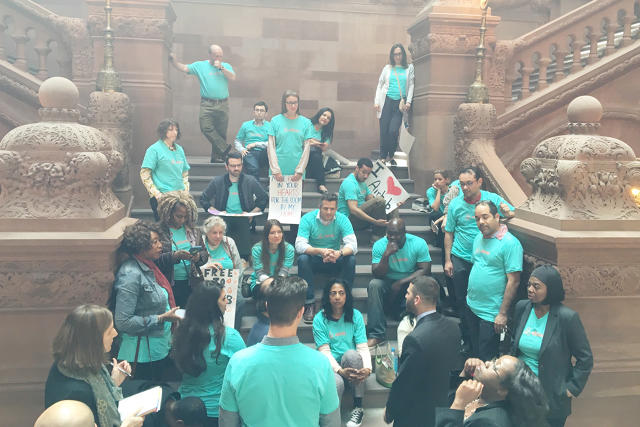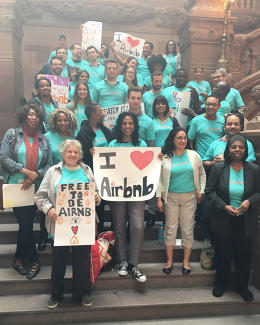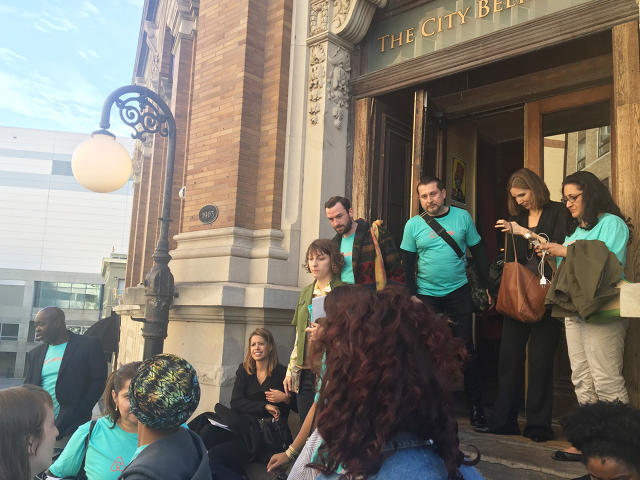How Airbnb Turned Its Hosts Into Political Foot Soldiers
It’s 7:30 a.m., and a couple-dozen groggy Airbnb hosts are boarding a bus parked at the southeast side of New York City’s Union Square. Besides apartment listings on the site, they have little in common. Chris Gatto, a gray-haired freelance business coach with thick glasses, walked to the bus from his East Village apartment. Danielle Herard, an independent insurance broker, woke up at 4:30 a.m. in Crown Heights, where she uses Airbnb to help pay the rent while she starts a design business. An antiques dealer who has been priced out of her Williamsburg storefront wears an army jacket. Another host, who falls asleep under his eye mask before the bus departs, wears a literal white collar.
“Good morning everyone, thanks for your patience,” announces one of the nine full-time neighborhood “mobilizers” who Airbnb has hired in New York to organize groups like this one. “Thank you for coming with us to Albany to talk with decision-makers about your hosting experience.”
As the bus pulls away from the curb, she and her fellow organizers hand out bright seafoam green T-shirts printed with Airbnb’s logo, paper lunch bags filled with bagels and bananas, and large white folders containing details for meetings with elected officials. A photographer who Airbnb has hired to document the event pushes the shutter button on her camera a few times before she settles into her seat.

If this feels like a political campaign, it’s because it is one. Airbnb, which, based on the number of listings posted on its site, is now the largest hospitality company in the world, faces regulatory battles in just about every major U.S. city, including New York. Critics, including some powerful hotel unions, say the rental site contributes to rising rents and creates rowdy transient traffic to residential neighborhoods. Airbnb has hired a staff of lobbyists, political organizers, and former political campaign managers to challenge this message, and they’ve spent as much as $8 million on a single local campaign.
Failure to fix Airbnb’s regulatory problems in New York and elsewhere would hurt the $25.5 billion-valued company’s prospects with future investors, public markets, and the public. “The prospect of having to face regulatory risk questions every time they announce earnings, it’s just going to stymie the growth of the company,” says Arun Sundararajan, an NYU professor and the author of a recent book about the sharing economy. Airbnb’s regulatory issues could also prove damaging to its carefully pruned brand, casting the platform as a seedy operation rather than a hip way to experience a new city or make extra income.
In New York City, according to a 2014 report by the attorney general, 72% of Airbnb’s reservations over the previous few years had violated a law that bans residents from subletting their entire homes for periods fewer than 30 days. On today’s lobbying agenda is a bill that, if passed in the state legislature, would fine hosts who advertise these short-term rentals up to $7,500. Longer term, Airbnb has its eye on a bigger goal: It plans to propose legislation that will differentiate between illegal hotel operators and occasional hosts, permitting people like Chris and Danielle to legally rent their homes when they’re out of town. “Possible legislation in NYC regarding subletting of apartments” first appeared on its lobbying agenda in 2010.
“Globally, there is no question this is our toughest fight,” says Nick Papas, Airbnb’s director of public affairs, who is making the trip to Albany, along with an Airbnb press secretary and two representatives from Risa Heller Communications, the company’s New York city public affairs consultancy. That morning, the Wall Street Journal reported that the New York Hotel Trades Council (HTC) and another hotel union, Unite Here, have supported the city’s anti-Airbnb political campaign, Share Better. In one example of the group’s political influence, Manhattan City Council Member Helen Rosenthal, who has proposed legislation to increase fines on illegal listings, writes in an email to a consultant for Share Better that no, she doesn’t need to see the final version of an op-ed he has written for her. (Unite Here did not respond to multiple requests to comment for this story, and HTC declined to comment).
Airbnb’s opponents paint the site as a facilitator of illegal hotels, pointing out that when Airbnb released some New York City data in December, the 2% of New York City hosts with three or more listings made up 24% of Airbnb’s revenue in the city (Airbnb says it actively purges this type of listing from the site). Opponents have also blamed the site for making an already tight housing market tighter, contributing to skyrocketing rents. As Council Member Rosenthal recently put it in a joint statement with another council member this March: “If Airbnb truly cared about middle class New Yorkers, they would not continue to allow landlords to take valuable apartments off the market, exacerbating our serious housing crisis.”
Inside this bus is Airbnb’s counter-narrative.
Airbnb started its first “grassroots” lobbying campaign in 2013, through an organization called Peers (the nonprofit called itself “a member-driven organization that supports the sharing economy movement,” but it had deep links with the company). Though Peers has since been remade as a resource for gig economy workers, in the beginning, the site helped hosts create online petitions to send to local legislatures, organized meetups, and hosted one-off dinners. A for-profit marketing agency called Purpose orchestrated the movement.
Airbnb had started its lobbying efforts in NYC three years prior, in 2010, when it spent $16,300 to contract with a lobbying firm. According to records from the New York State Joint Commission on Public Ethics, Airbnb’s spending in New York has increased steadily since. In 2013, the year Peers launched, it spent $120,000. The next year, it hired an additional lobbying firm to focus specifically on local government, and used online banner ads, billboards, and local TV spots to promote a feel-good campaign with the message “NYC Supports Airbnb.”
As Peers was being reinvented, Airbn seems to have intensified focus on grassroots organizing. In 2015, it listed Hilltop Public Solutions, which promotes its ability to “find and mobilize grasstops and grassroots advocates across the country,” as its biggest lobbying expense, aside from the $337,500 it spent on lobbying firms (Airbnb says it no longer works with Hilltop). To put that number into perspective: Uber, which has also and is part of the same NYC industry advocacy group as Airbnb, spent nearly twice that amount on New York state and local lobbyists over the same period; Google spent about a third that amount; The Hotel Trades Council spent $90,000. The New York lobbying expenses Airbnb filed last year included Facebook advertising and a “grassroots email service” for the first time.
Airbnb’s most recent strategy is to establish its hosts as a constituency. “It’s easy to attack Airbnb as a faceless entity, but it’s really a community of hosts,” says Airbnb’s New York City campaign manager Josh Meltzer, who before landing at the hospitality site worked on the marriage equality movement and at the attorney general’s office. “[Representatives who meet hosts] have to think, this actually means something to people I represent.” Airbnb’s policy chief Chris Lehane has compared Airbnb’s userbase (about 60 million worldwide) to the National Rifle Association and the National Education Association. He announced shortly after Airbnb defeated Proposition F in San Francisco that the company would help fund “home-sharing clubs” in 100 cities around the world.

Building a constituency requires more than online petitions. After three long hours of bus time between New York City and Albany, it’s apparent that the 28 hosts who dragged themselves out of bed early to talk to their state representatives are deeply engaged. That’s no accident.
“My organizer is Connor, over there,” explains Jordan Reeves, a 31-year-old Williamsburg resident who hosts Airbnb guests in the second room of an apartment he shares with his boyfriend. He’s already halfway into a bean burger sandwich when I plop my own box lunch next to him in the capitol’s mall-like cafeteria, and like the other hosts, he has changed into the bright seafoam green Airbnb T-shirt. When he joined Airbnb in 2012, he tells me, he and a roommate rented out the pullout couch in their living room. Now, the Airbnb income helps he and his boyfriend, who replaced the roommate in 2013, to pursue their respective dreams of an art career and founding a nonprofit. They meet people from all around the world, and they love participating in the “host community.”
Airbnb has helped cultivate this community through events that aren’t all political in nature. In New York, it works with the Brooklyn Chamber of Congress, which recruits local businesses to talk with Airbnb hosts. Airbnb’s organizers also partner with Win, a nonprofit that supports homeless New York City women, to throw volunteering events for hosts. Jordan recently hosted a walking art tour of Williamsburg for his fellow Airbnb members. “I hosted for hosts,” he explains, animating the phrase with a singsong rhythm. Every once in a while, Airbnb asks its most engaged hosts if they’ll step up and help with the campaign. The company held its first Albany lobby day at the capitol last year (Jordan was there, too), and it regularly connects hosts with representatives in city hall from their districts.
After lunch, the Airbnb hosts migrate from the capitol’s modern mall wing to the lavish and historic “million dollar staircase,” on top of which Airbnb has planned a press conference to address the proposed $7,500 fee on advertising short-term rental listings. In a statement, Assemblywoman Linda Rosenthal, the bill’s sponsor, would tell Politico, the only news outlet that covered the press conference, “At a time when Airbnb is under fire for taking away affordable housing through its platform and for turning a blind eye to racial bias, the last thing they should do is try and weaken a law that protects tenants.”
On the way to the staircase, the hosts pass lobbying groups that appear to be using the same playbook, down to their brightly colored T-shirts. “Nurses for Hillary” wear purple. The “Healthcare Workers Day of Action” crowd is in neon yellow.
“So, what are you all lobbying today?” Jordan asks the suited woman sitting next to him at a long table.
He, another host, and a pro-Airbnb small business owner from Williamsburg have plans to meet with Assembly Member Joe Lentol, and the woman, an Airbnb lobbyist, is waiting to introduce them. Airbnb has organized 23 meetings between hosts and lawmakers today, and the lobbyist explains that she’s not doing meetings on behalf of other clients.
“Thank you!” Jordan tells her, with his usual enthusiasm.
The lobbyist returns the inquiry. “What is your message?”
Airbnb’s grassroots lobbyists had the option to attend a training session the week before to prepare them for this very question.
Lydia Rockett says that all of the local clientele for her antique shop in Williamsburg, Brooklyn, are gone, out shopping on their lunch breaks in Manhattan instead of patronizing local businesses like hers, which she has moved online amidst rising storefront rents in the neighborhood. “You want the extra traffic,” the lobbyist rephrases. Rockett clarifies: “I need it because there is no local traffic anymore.”
A host named April, who has short bangs and a smiling demeanor, says she has “a pretty typical host story.” She’s hosted almost 100 people, and nothing bad has ever happened. “You’re not just letting a stranger in with no credentials,” she says.
Jordan says he’s going to talk about “three core tenets.” First, taxes: Airbnb wants to remit them (last year, the company wrote all 213 members of the New York State Legislature with this request). Second, “big data is really where it’s at,” and Airbnb has a lot of it that it is willing to share with cities. Three: Airbnb doesn’t believe it impacts long-term housing and its affordability.
“That’s what we’re up here talking about every day,” the lobbyist says.
When Lentol—a 73-year-old with a sense of humor and a polka-dot bow tie—enters the room, the group delivers its talking points as planned. Connor, who is sitting away from the table in a chair alongside the wall, says nothing. Lentol tells them he thinks they’re the future and anyone who disagrees with them “should be shot.” Then he starts weighing the political feasibility out loud. In November, for instance, New York City Mayor Bill de Blasio said he would spend $10 million over the next three years to enforce illegal hotel laws.
“Your task is not an easy one,” he concludes.
Does Airbnb actually impact housing prices in New York City? There’s plenty of debate, but this is not necessarily the most important concern for Airbnb’s political campaign. Hotel unions have a track record of organizing voters. Airbnb does not.
As Airbnb’s political situation becomes more threatening in New York, the company is doing its best to change that by making its best hosts more visible to lawmakers. But perhaps an even more promising political strategy lies in a potential partnership with the Service Employees International Union (SEIU). In a Brooklyn pilot, the company directed its hosts to a unionized COOP for cleaning services. If the partnership moves forward, it would align Airbnb and the SEIU. With a union on each side of the debate, the political cards would be more evenly matched.
At the end of the day, the hosts file into The City Beer Hall for a private closing event on the top floor. As they eat sliders and mac and cheese, a mobilizer asks for their feedback on the day’s lobbying efforts.

“She asked for a T-shirt,” says one woman of a particularly brisk legislative meeting. “I don’t think, if she doesn’t want to be associated with Airbnb, she would ask for a T-shirt.”
Jordan comments that he enjoys everyone’s company and is glad that they’re all in this together. “I can think of no better group than the lot of you,” he concludes.
The feel-good moment only lasts a beat before another host chimes in with advice from her legislative representative. “You’re going to have to come back again and again,” the lawmaker had told her, and so, she says, “This might feel good in the moment, but it’s still going to be an uphill battle.”
“Does anyone else want to share?” asks the mobilizer.
“Okay, let’s raise our glasses and cheer.”
Smiling hosts obediently lift their bottles of beer and cups of wine. The sound of the photographer’s camera cuts through the clinking glass—a series of rapid-fire clicks.
Fast Company , Read Full Story
(64)














